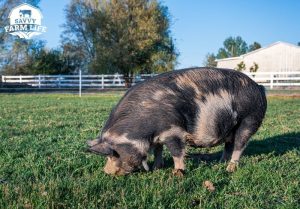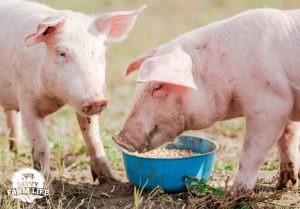
What to Know Before Getting Pigs
If you have considered whether raising pigs is right for you, you are far from alone – there are around 800 million domesticated pigs worldwide, and they account for a whopping 40% of the world’s meat consumption. If you are wondering whether pigs will work for your lifestyle, know that there are pros and cons to raising these animals.
What are the pros and cons of owning and raising pigs? There are several pros to raising pigs, and also several cons. Some of the pros include their low-maintenance care, the amount of meat you get per animal, their quick growth rate, and their knack for eating anything – all the while giving you a quality product. Some of the cons of raising pigs include the fact that pigs are destructive, they are difficult to keep contained, they have particularly offensive manure, and they eat a lot. They are also incredibly smart – you can be the judge of whether this is a pro or a con.
Raising pigs is quite different then raising sheep or cows. While pigs are livestock animals, they have much different behaviors and needs than other livestock animals you may be used to. To learn more about the pros and cons of raising pigs, keep reading!
Pro Of Raising Pigs #1: Pigs Are Easy To Care For
Compared to other livestock, pigs are relatively easy to care for. They do not need as much hoof care as other livestock like sheep and goats, and they do not need to be shorn regularly like sheep and alpacas do. They are hardy animals, and they can (and do) eat just about anything.
Pigs are quite adaptable, and are able to live in a variety of climates. So long as they have a simple structure to escape from the elements, they will be happy. If you live in a particularly cold climate, you may want to look at a breed of pig bred for its thicker skin and hair, like the Duroc (which is the second most popular pig in the United States). If you live in a hot climate, know that almost any pig will do just fine, so long as they have a shade structure they can escape to in order to avoid sunburns.
Pro Of Raising Pigs #2: You Get A Lot Of Meat Per Pig
Pigs yield a high meat ratio compared to some other livestock, and you can expect to get at least 50% of the animal’s live weight in freezer meat. That means that if you send your 300-pound pig to slaughter, you can expect to put away at least 150 pounds of meat into your freezer.
So does this mean that you should try to get the most out of each pig? While many pigs can reach a mature weight of 700-800 pounds, it is especially challenging to transport and butcher an animal this size. Most pig farmers finish their hogs at around 300 pounds. This usually allows for enough fat to add to the flavor of the meat, while providing for an easier time in transportation and processing.
To learn the best pig breeds for meat production, visit my article Meat Pig Breeds: 8 Best Pig Breeds For Meat.
Pro Of Raising Pigs #3: Pigs Grow Quickly
Meat-producing animals in general have been bred over the years to grow at rapid rates – this is because it makes for a more economical business model. If you can send your pig to slaughter at 6 months instead of at 12 months, you are cutting down on the care, space, and (some of) the feed that your pig requires by 50%.
So how fast do pigs grow? Most pigs are ready to slaughter at around 6 months of age; however, some breeds are bred to grow even faster than others. If you purchase a young pig at 50 pounds, you might see them reach a finishing weight of 300 pounds within only 4 – 5 months.
Pro Of Raising Pigs #4: Pigs Will Take Care Of Your Food Waste
Pigs will eat your food waste. All of it (well, maybe leave your pork trimmings out of their feed bucket). Pigs are omnivores and are the least picky of all livestock when it comes to food, so you can feed them anything from your kitchen that is not moldy. Many homesteaders with pigs keep a pail or other container in the kitchen where they throw food scraps as they work in the kitchen – apple peels, egg shells, the hamburgers your kids didn’t finish, stale crackers, half-eaten string cheese. While many homesteaders also compost food scraps, your pigs can eat all of the edible items that are not suitable for the compost pile.
Pro Of Raising Pigs #5: You Know Where Your Food Comes From
This is one of those benefits that is tough to quantify, but many people claim this is the reason they keep pigs. The truth is, most commercial pig farms are not the sanctuaries that we like to imagine our pork coming from. Most of the pigs are raised in cramped conditions, and are given antibiotics from a very young age to help prevent the spread of disease. Whatever your views on factory farming, we can all agree that a handful of pigs raised on a homestead are probably living happier lives than the millions of pigs raised commercially.
When you raise your own meat, you are controlling your pig’s feed and environment. You are able to raise your pigs in a respectful way, doing what you can to limit the amount of stress that they experience at the hands of humans, and giving them the freedom to roam and root as they are meant to.
Con Of Raising Pigs #1: Pigs Eat A Lot
 Pigs eat a lot. Pigs will eat at least 5 pounds of feed per day, which is almost a ton of food annually. While you will be able to feed your pigs almost all of your leftover food, you will not be able to sustain a pig on kitchen scraps alone. The bulk of their diet will have to come from a commercial pig feed – usually pellets. Some keepers choose to free-feed their pigs, while others feed twice per day to encourage them to graze. Either way, you will be going through a lot of feed.
Pigs eat a lot. Pigs will eat at least 5 pounds of feed per day, which is almost a ton of food annually. While you will be able to feed your pigs almost all of your leftover food, you will not be able to sustain a pig on kitchen scraps alone. The bulk of their diet will have to come from a commercial pig feed – usually pellets. Some keepers choose to free-feed their pigs, while others feed twice per day to encourage them to graze. Either way, you will be going through a lot of feed.
Con Of Raising Pigs #2: Rooting Is Destructive
Pigs “root” around in the ground with their snouts in search of food. This is a natural pig behavior that is actually considered an ecological benefit (in moderation) within the feral pig population, because they naturally till the earth with their snouts and encourage healthy plant life cycles. In your pasture, however, this can be destructive. They are harder on pasture than most other livestock.
Con Of Raising Pigs #3: Pigs Are Smelly
Pigs are actually very clean animals, preferring to eliminate away from where they sleep and eat. But the truth is, pig manure is smellier than average. It is not their fault of course – it has to do with the unique combination of hundreds of compounds including ammonia and hydrogen sulfide. Studies have shown that out of three researched industries – pig farms, dairy farms, and poultry farms, pig farms were the stinkiest of the bunch. You will need to keep up on cleaning out the pen regularly to keep your neighbors happy.
The good news is that there are some things you can do to manage pig odor. To learn more, check out my article Do Pigs Smell Bad? Pig Odor Guide.
Con Of Raising Pigs #4: Pigs Are Difficult To Contain
Pigs are smart. And strong. These two attributes together can make it difficult to keep pigs contained, with many pig farmers resorting to electric fencing to keep their pigs from escaping their pens. This is a con because the simple set-up that might work for your sheep or poultry may not work to contain pigs. You may find yourself with the added expense (and work) of building and maintaining a new method of fencing.
Pro AND Con Of Raising Pigs: Pigs Are Smart!
There are only three animals known to be smarter than pigs – dolphins, (some) apes, and elephants. Pigs are incredibly intelligent. This can be a pro because they are fun to raise and they are highly trainable. You don’t need to worry about rounding them up at the end of the day – it’s easy to train them to come to you when called. They have wonderful personalities and are curious and friendly.
Their intelligence can also be a con because they can get bored easily. What is true for kids (and border collies) is true for pigs – boredom can lead to trouble. Bored pigs often become destructive, and will spend their time looking for a way out of their pen. There is another con to their intelligence – is it really so easy to butcher an intelligent being that comes to you when called and enjoys rolling a soccer ball around the yard? You will need to stay somewhat detached if you are raising pigs for meat.
Do The Pros Outweigh The Cons of Owning Pigs?
Now that you know some of the pros and cons of raising pigs, you will need to decide if the benefits outweigh the disadvantages. You may decide that raising pigs sounds amazing and that you are ready to take on this adventure. Or, you may decide that raising pigs sounds a bit too daunting. If you’re still on the fence, visit a local pig farm. Their personalities may just win you over. Or, the smell might send you in the other direction.
Another pro of raising pigs is that they can co-exist with poultry, saving you space. To learn more about keeping pigs with chickens, visit my article Can Pigs and Chickens Live Together?
